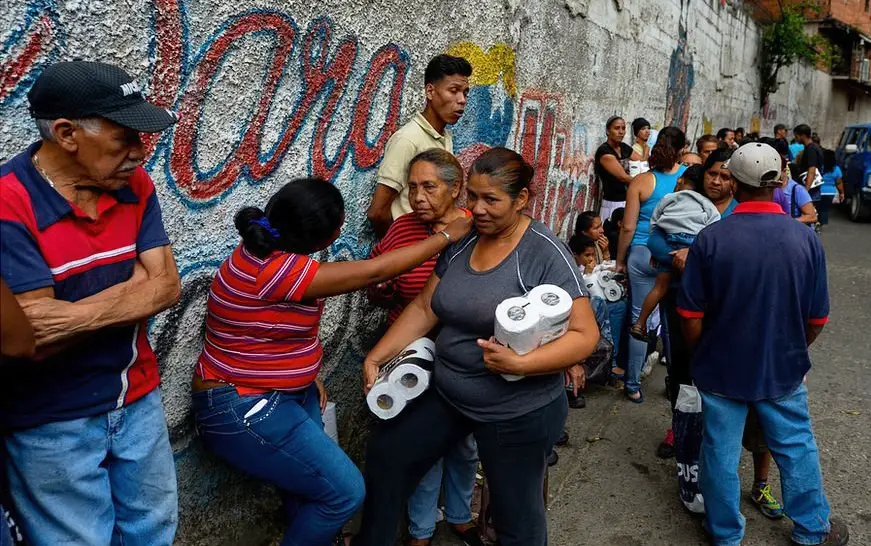These days, much is heard and read about the concept of “anthropological damage.” This notion describes the deep harm allegedly caused by 25 years of Chavismo on Venezuelans. The concept comes from Cuban analyst Dagoberto Valdés, who uses it to explain certain behaviors among Cubans subjected to the long ordeal of the communist revolution. Valdés defines anthropological damage as the “weakening, injury, or breakdown of what is essential to the human person.”
Does this concept have any foundation? Can it help us understand the situations of domination experienced in Cuba and Venezuela? Examining Valdés’s definition, he appeals to a “human essence” that, when weakened, injured, or broken, contrasts with an originally “good” nature. This suggests that Cubans or Venezuelans before the revolutionary era were inherently good in a moral sense but were corrupted by totalitarian or authoritarian regimes. Is this true? No. Neither Cuba nor Venezuela were moral paradises before their respective socio political disruptions, nor were they hellish. These were societies with both virtuous and dark moments.
What Valdés attempts to describe as anthropological damage—a corruption of the moral and psychological DNA of Cubans—is not the result of perversions introduced by a corrupt and corrupting regime. It is more a combination of techniques used by tyrannical regimes to intensify human miseries alongside pre-existing features of Cuban society before Fidel. Anthropologically, human beings have both good and bad tendencies that existed long before Cuban communists or Venezuelan Chavistas came to power.
The Venezuelan nature of Chavismo
Chavismo is a profoundly Venezuelan sociopolitical and cultural phenomenon. Hugo Chávez, the Chavista leadership and their followers (both then and now, though greatly diminished) were and are Venezuelans, not extraterrestrials. This Venezuelan base gave rise to a political movement marked by well-known flaws in the collective Venezuelan psyche. One of these, as old as the civil wars from independence to the guerrilla movements of the 1960s, is resentment, as Carlos Lizarralde illustrated in his essay Venezuela’s Collapse: The Long Story of How Things Fell Apart (2024).
If resentment motivated Chavismo’s emergence, its perfect complement is violence, another hallmark of Venezuelan history. Chávez entered the public stage with the violence of February 4, 1992, followed by November’s violence that same year. Other violent episodes followed, such as April 11, 2002, with its tragic death toll and a series of political assassinations inside and outside Chavismo. We should also note the crime wave merging criminality with political-social control since Chávez’s time, including the recent police and military violence against protesters and opposition figures after the July 28 elections. This violence, authoritarianism and the exercise of power through the formal state, irregular gangs and criminal or guerrilla forces are all part of Venezuela’s anthropological fabric.
Corruption is another characteristic embedded in Venezuelan society since the formation of the collective that would later become the nation-state of Venezuela. Chavismo has built upon this foundation to create the most corrupt era in Venezuela’s history. However, it has not done so by creating “anthropological damage” but rather by amplifying the historical-social corrupt base already present.
Valdés suggests that fear and submission are part of the anthropological damage these authoritarian regimes impose. Yet history shows that Venezuelan society, known for its resentment and rebellion, has also chosen silent submission to avoid repression and persecution. How else could we explain that the majority, who voted directly and universally for the writer Rómulo Gallegos as president in December 1947, did not lift a finger to protest the military coup against the Doña Bárbara author just months later, in 1948? Fear has always been present and Chavismo has learned to harness it to instill submission.
Could we change the anthropological foundation?
This question is largely unproductive, as I reject the fallacy of supposed anthropological damage and instead recognize that most of Venezuela’s problematic traits have always been present. Should we then get to the root of these traits to change them? I’m not sure this is possible. It would require a pointless generalization (there is a wide variety within any society) and, if feasible, would involve a massive social engineering plan potentially more oppressive than the communist or Chavista subjugation itself.
Perhaps the most significant change Chavismo has brought to Venezuelan society is the emigration of millions of its citizens now dispersed around the world. Rather than anthropological damage, this emigration has fostered a sense of rootlessness and diaspora for Venezuelans separated from their homeland.
A good friend asked me what Venezuelans might learn from the Jewish experience of exile. My answer was that it would be difficult for Venezuelans to learn from the experience of mass exile, which is relatively recent in their short national history. The Jewish people have experienced centuries of exile. Their collective consciousness is marked by the trauma of displacement and the drive to overcome spiritual and territorial exile. The only thing a Jewish person might teach a Venezuelan is that solidarity can be built from exile. This is no small feat for the exiled, who, like Venezuelans, must focus on the individual survival of themselves and their families, both those who left and those who stayed behind. Probably more important than exile is the awareness of having a common, immaterial, transcendent heritage, but this is not so evident for a young nation like Venezuela. There will be solidarity as long as Venezuelans consider themselves a collective that deserves to preserve its intangible heritage even outside its borders.
It is possible that Venezuela’s shift toward democracy could benefit somewhat from the Venezuelan diaspora. I don’t believe many will return, though commercial, cultural, educational and research ties are being woven that could benefit the country. As with many paradoxical social processes, the forced migration of millions of Venezuelans could prompt a shift in the country’s mentality. This is not a guarantee, but a probability. The knowledge and experiences of Venezuelans living abroad could support those who remain in various ways. There may also be investments from those who prospered outside Venezuela and wish to do business when democracy returns. In the commercial sector, networks of Venezuelans could boost exports of Venezuelan products, as we are already beginning to see.
Chavismo will likely leave a mixed legacy. It has exploited the worst aspects already present in Venezuelan society, elevating them to levels of depravity unseen during the so-called civil republic. Despite its politics of resentment and revenge, Chavismo has also catalyzed positive developments, such as the organization of a civil society that resists the autocratic boot. The global Venezuelan networks created have the potential to promote internal changes if the distrust, fear and envy, which have pervaded these dark times, can be overcome.













